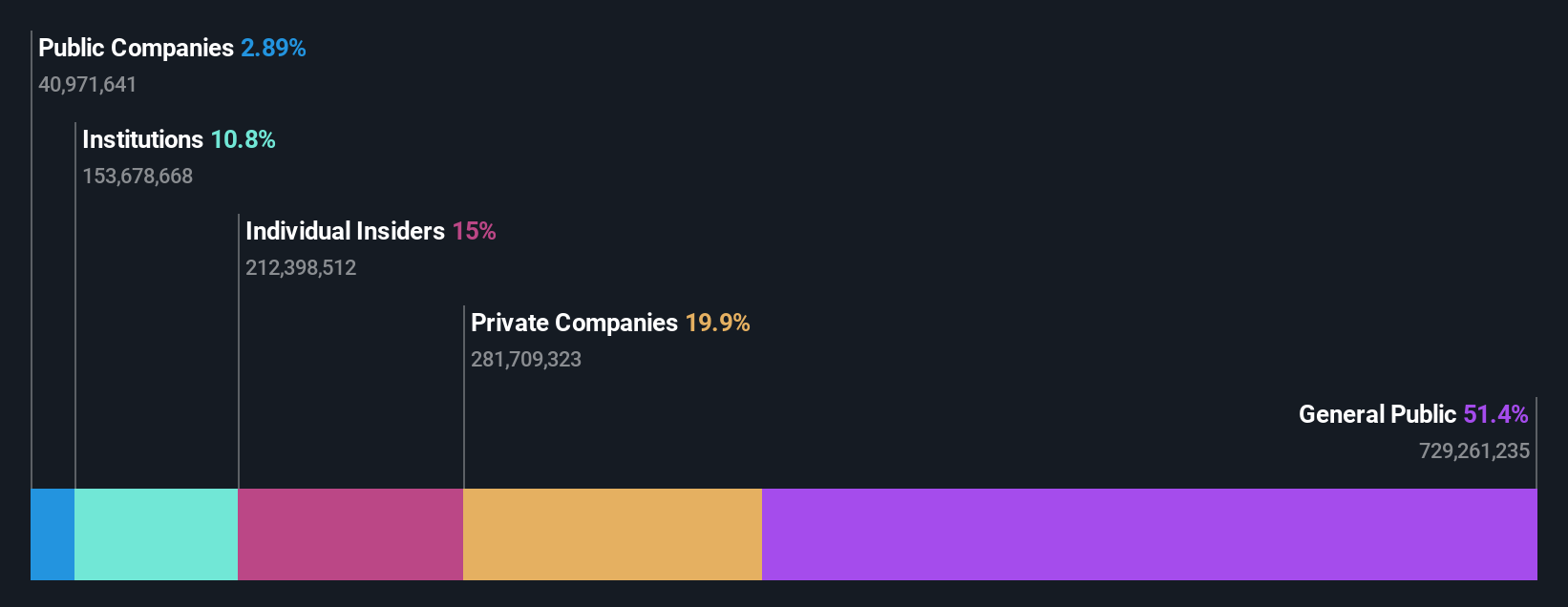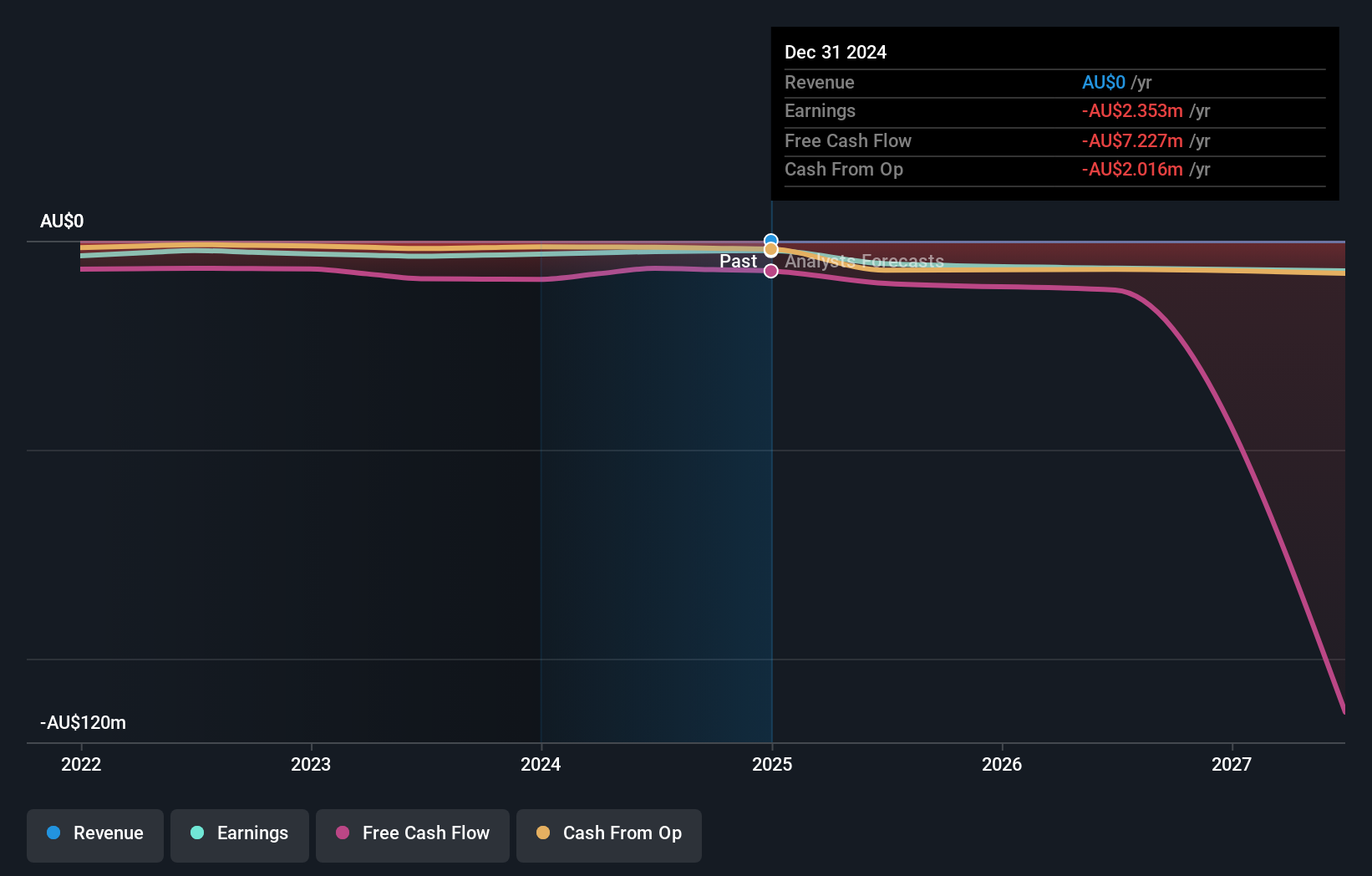- Australia
- /
- Metals and Mining
- /
- ASX:AAR
Astral Resources NL's (ASX:AAR) market cap surged AU$28m last week, individual investors who have a lot riding on the company were rewarded

Key Insights
- The considerable ownership by individual investors in Astral Resources indicates that they collectively have a greater say in management and business strategy
- A total of 25 investors have a majority stake in the company with 48% ownership
- 15% of Astral Resources is held by insiders
If you want to know who really controls Astral Resources NL (ASX:AAR), then you'll have to look at the makeup of its share registry. The group holding the most number of shares in the company, around 51% to be precise, is individual investors. In other words, the group stands to gain the most (or lose the most) from their investment into the company.
Clearly, individual investors benefitted the most after the company's market cap rose by AU$28m last week.
Let's take a closer look to see what the different types of shareholders can tell us about Astral Resources.
See our latest analysis for Astral Resources

What Does The Institutional Ownership Tell Us About Astral Resources?
Many institutions measure their performance against an index that approximates the local market. So they usually pay more attention to companies that are included in major indices.
As you can see, institutional investors have a fair amount of stake in Astral Resources. This can indicate that the company has a certain degree of credibility in the investment community. However, it is best to be wary of relying on the supposed validation that comes with institutional investors. They too, get it wrong sometimes. When multiple institutions own a stock, there's always a risk that they are in a 'crowded trade'. When such a trade goes wrong, multiple parties may compete to sell stock fast. This risk is higher in a company without a history of growth. You can see Astral Resources' historic earnings and revenue below, but keep in mind there's always more to the story.

Astral Resources is not owned by hedge funds. Looking at our data, we can see that the largest shareholder is Simon Braham with 6.1% of shares outstanding. The second and third largest shareholders are 1832 Asset Management L.P. and ACN 106 966 401 Pty. Ltd., with an equal amount of shares to their name at 5.6%. Additionally, the company's CEO Marc Ducler directly holds 0.9% of the total shares outstanding.
Our studies suggest that the top 25 shareholders collectively control less than half of the company's shares, meaning that the company's shares are widely disseminated and there is no dominant shareholder.
While studying institutional ownership for a company can add value to your research, it is also a good practice to research analyst recommendations to get a deeper understand of a stock's expected performance. There is a little analyst coverage of the stock, but not much. So there is room for it to gain more coverage.
Insider Ownership Of Astral Resources
The definition of an insider can differ slightly between different countries, but members of the board of directors always count. The company management answer to the board and the latter should represent the interests of shareholders. Notably, sometimes top-level managers are on the board themselves.
Insider ownership is positive when it signals leadership are thinking like the true owners of the company. However, high insider ownership can also give immense power to a small group within the company. This can be negative in some circumstances.
Our most recent data indicates that insiders own a reasonable proportion of Astral Resources NL. It has a market capitalization of just AU$241m, and insiders have AU$36m worth of shares in their own names. We would say this shows alignment with shareholders, but it is worth noting that the company is still quite small; some insiders may have founded the business. You can click here to see if those insiders have been buying or selling.
General Public Ownership
The general public, mostly comprising of individual investors, collectively holds 51% of Astral Resources shares. This level of ownership gives investors from the wider public some power to sway key policy decisions such as board composition, executive compensation, and the dividend payout ratio.
Private Company Ownership
Our data indicates that Private Companies hold 20%, of the company's shares. It might be worth looking deeper into this. If related parties, such as insiders, have an interest in one of these private companies, that should be disclosed in the annual report. Private companies may also have a strategic interest in the company.
Next Steps:
I find it very interesting to look at who exactly owns a company. But to truly gain insight, we need to consider other information, too. Be aware that Astral Resources is showing 4 warning signs in our investment analysis , and 3 of those shouldn't be ignored...
If you are like me, you may want to think about whether this company will grow or shrink. Luckily, you can check this free report showing analyst forecasts for its future.
NB: Figures in this article are calculated using data from the last twelve months, which refer to the 12-month period ending on the last date of the month the financial statement is dated. This may not be consistent with full year annual report figures.
New: Manage All Your Stock Portfolios in One Place
We've created the ultimate portfolio companion for stock investors, and it's free.
• Connect an unlimited number of Portfolios and see your total in one currency
• Be alerted to new Warning Signs or Risks via email or mobile
• Track the Fair Value of your stocks
Have feedback on this article? Concerned about the content? Get in touch with us directly. Alternatively, email editorial-team (at) simplywallst.com.
This article by Simply Wall St is general in nature. We provide commentary based on historical data and analyst forecasts only using an unbiased methodology and our articles are not intended to be financial advice. It does not constitute a recommendation to buy or sell any stock, and does not take account of your objectives, or your financial situation. We aim to bring you long-term focused analysis driven by fundamental data. Note that our analysis may not factor in the latest price-sensitive company announcements or qualitative material. Simply Wall St has no position in any stocks mentioned.
About ASX:AAR
Astral Resources
Engages in the exploration and evaluation of gold properties in Western Australia.
Flawless balance sheet slight.
Market Insights
Community Narratives




